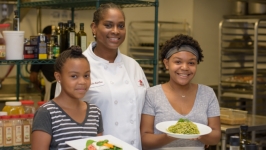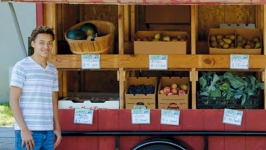Alphabet Academy: Teaching the ABCs of Healthy Eating
Anyone who has raised a small child – or was once one themselves – knows that most children are notoriously picky about what sorts of foods they’re willing to eat. In a time before processed, heavily modified foods, the naturally healthy quality of food kept the worst aspects of this youthful dietary prejudice in check, but in today’s world of factory-produced food (rich in addictive salts, fats, and sugars) and exceptionally busy parents, ensuring children develop a taste for nutritious and well-rounded foods is often secondary to more urgent demands.
Finding ways to help remedy this was just one of Amy Small’s concerns when she opened Alphabet Academy. Founded in 2004, the early learning center functions both as a childcare operation (hosting infants through to kindergartners from 7am to 6pm, weekdays) and a holistic learning environment that adheres to the principles of the Reggio Emilia philosophy. That doctrine was established shortly after World War II in Italy by teacher Loris Malaguzzi, who sought to restore to his town a sense of communal belonging that invested in future generations by treating young children as active and capable contributors to society. In line with that, students at Alphabet Academy engage in all aspects of their daily education, from the lessons themselves to the meals that they eat.
However, in the beginning, food was a less central part of the school’s programming. Alphabet Academy’s focus on food and diet grew naturally from the hurdles that feeding young children presented the staff. “The children were bringing in their own lunches, and we noticed that some of the lunchboxes contained processed and prepackaged food,” says Mireille Esponda, Director of Alphabet Academy’s North Campus. “We could see the results of that sort of diet immediately. Their behaviors were just so erratic.”
At first, the school worked to combat this by serving simple snacks like raw vegetables and fruits. This later progressed into serving school-prepared lunches, but the process was not without growing pains. Accustomed to less healthy, more immediately pleasurable foods, the children resisted this effort to introduce new flavors. Although the staff was tempted to assuage the children with old favorites, like peanut butter and jelly sandwiches, they resisted this slippery slope and instead focused on continually reintroducing healthy foods that the children initially refused. “Children really need to have things served to them 20 times for them to begin to take an interest in them,” Esponda explains, and eventually, the combination of hunger and curiosity got the best of even the most reluctant kids, who ultimately developed an appreciation for foods and tastes normally ascribed to adults. “At a restaurant, instead of eating from a kid’s menu, they’ll eat real food,” says Chef Kimberly Langella, who started Alphabet Academy’s food program with Amy Small. “And you should see the looks on the servers’ faces. ‘You want pasta?’ they’ll ask, and be shocked to hear from a child ‘Oh, no thank you. Can I have steamed broccoli, please?’”
While the staff of Alphabet Academy is always excited to see their young charges tackling flavors above their age grade, their focus is not merely on introducing new tastes. When making menu decisions, their guiding principle is to ensure that the children have wholesome and nutritious food. Although their menus are not exclusively organic, they make sure that the infamous “dirty dozen” (foods that are particularly toxic when non-organic) always are, and they source from local farms whenever possible. Vegetables from Hindinger Farm in Hamden, Massaro Community Farm in Woodbridge, and Cecarelli Farms in Northford all make regular menu appearances, as do the hormone- and antibiotic-free dairy products from The Farmer’s Cow collective of producers.
The quality of Alphabet Academy’s food is an intimate matter for the school’s Executive Chef, Christina Mercurio. “For me, this philosophy started at a personal level, when my son was an infant. I would offer him food, and he would literally just open his mouth. He would trust whatever I was giving him, and this caused me to think much more carefully about food, in general, and the quality of what I was feeding him.” It’s a philosophy that extends to careful vetting of her menu choices; all of Alphabet Academy’s menus are sent to a licensed nutritionist who reviews them to ensure nutritional completeness.
But all the effort poured into teaching good dietary habits is for naught, unless those lessons extend to the home and what parents are serving their children once they return from school. “If you have a parent that’s not working with you, and their kids are just eating macaroni or ‘beige’ foods when they’re at home, it’s not going to work,” says Chef Mercurio. “You have to have parents sharing good food at home, too.” Understanding the school’s dietary philosophy is “a big part of the conversation” with the parents of newly enrolled students, says Esponda, and in order to facilitate good home habits, Alphabet Academy offers take-home dinners for families to better help busy parents adhere to the eating practices that the school’s staff spends its days establishing.
This focus on food immersion informs much of the school’s programming. Sous-Chef Tuesdays find students in the kitchen preparing ingredients with the chefs, including de-leafing parsley, pulling grapes from the vine, or dicing sweet peppers. Students also participate in bi-weekly cooking classes with their chefs and taste testing classes where they learn to identify sweet, salty, bitter, and other flavor types, so that they can better communicate about and understand their food. Students also spend part of every day outside, regardless of weather, helping with the planting, maintenance, and harvesting of the school’s garden, as well as tending to the school’s chicken flock, all of which feels more like play than work.
With children this young, the threat of developing allergies is always a risk, and Alphabet Academy does not adhere to a nut-free menu. Because of this, the school enforces strict policies regarding introduction of new foods and restricts students from eating anything containing known potential allergens (such as almonds or other nuts) until their parents confirm that their child has eaten that ingredient in their home, without a reaction, at least three times. For those who do develop allergies, the school hopes to instill independence in their young eaters. Although instructors carefully monitor the diets of any students with allergies, “we like to help the children learn to self-advocate,” Esponda says, “so when food is served, they’ll learn to ask ‘Are there almonds in this?’ or ‘Is there dairy in this?’”
Ultimately, Alphabet Academy’s goal is to send their graduates into the world, better prepared for it. “We hope that our students become lifelong learners,” says Esponda, “to ask questions, to seek information, to stick up for themselves, and for each other. To look for answers and continue on a path of healthy eating, and of being foodies.” According to Chef Mercurio, there’s no better place to begin: “Foodies start in diapers. That’s our motto.”
Alphabet Academy (North Campus): 2389 Dixwell Ave., Hamden; 203-361-3340















